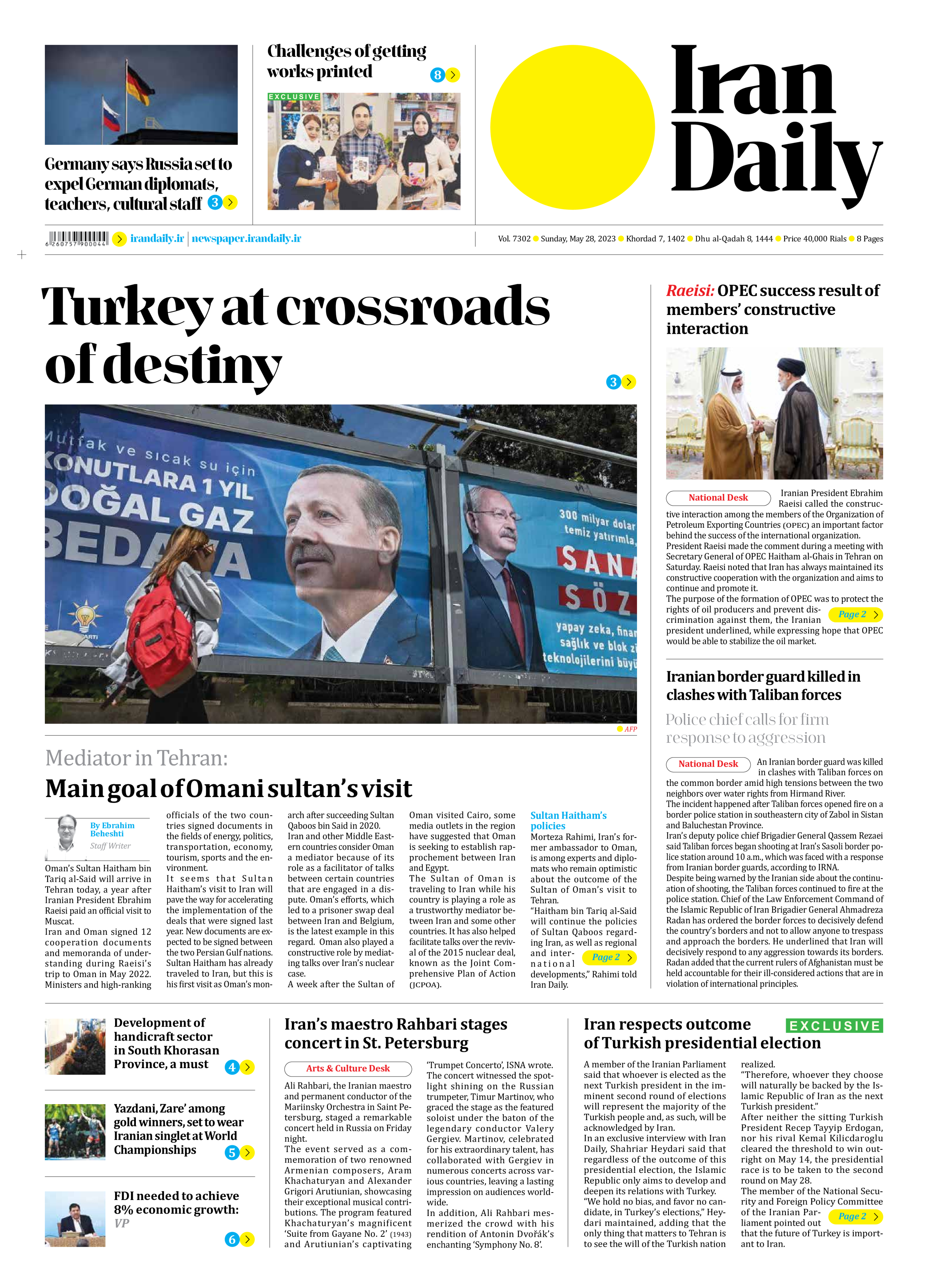
Mediator in Tehran:
Main goal of Omani sultan’s visit
By Ebrahim Beheshti
Staff Writer
Oman’s Sultan Haitham bin Tariq al-Said will arrive in Tehran today, a year after Iranian President Ebrahim Raeisi paid an official visit to Muscat.
Iran and Oman signed 12 cooperation documents and memoranda of understanding during Raeisi’s trip to Oman in May 2022. Ministers and high-ranking officials of the two countries signed documents in the fields of energy, politics, transportation, economy, tourism, sports and the environment.
It seems that Sultan Haitham’s visit to Iran will pave the way for accelerating the implementation of the deals that were signed last year. New documents are expected to be signed between the two Persian Gulf nations. Sultan Haitham has already traveled to Iran, but this is his first visit as Oman’s monarch after succeeding Sultan Qaboos bin Said in 2020.
Iran and other Middle Eastern countries consider Oman a mediator because of its role as a facilitator of talks between certain countries that are engaged in a dispute. Oman’s efforts, which led to a prisoner swap deal between Iran and Belgium, is the latest example in this regard. Oman also played a constructive role by mediating talks over Iran’s nuclear case.
A week after the Sultan of Oman visited Cairo, some media outlets in the region have suggested that Oman is seeking to establish rapprochement between Iran and Egypt.
The Sultan of Oman is traveling to Iran while his country is playing a role as a trustworthy mediator between Iran and some other countries. It has also helped facilitate talks over the revival of the 2015 nuclear deal, known as the Joint Comprehensive Plan of Action (JCPOA).
Sultan Haitham’s policies
Morteza Rahimi, Iran’s former ambassador to Oman, is among experts and diplomats who remain optimistic about the outcome of the Sultan of Oman’s visit to
Tehran.
“Haitham bin Tariq al-Said will continue the policies of Sultan Qaboos regarding Iran, as well as regional and international developments,” Rahimi told Iran Daily.
He said Tehran and Muscat have maintained coherence in their ties over the past decade and their relations have not witnessed fluctuations. The former ambassador noted that the Sultan of Oman’s visit to Tehran will help expand bilateral ties and accelerate the process of easing tensions between Iran and some regional countries.
Rahimi said the deals signed between Iran and Oman last year, and the agreements that will be signed during the Sultan of Oman’s visit are important to economists. He said this is because these agreements will help develop long-term and strategic visions considering trade transactions with Oman.
Rahimi said both countries have common grounds for making investments in various economic sectors, including the development of Iran’s Makran coast and Chabahar port, as well as Oman’s ports.
Tehran-Cairo ties
Reports indicate that meditation between Iran and Egypt is among the goals of the Sultan of Oman’s trip to Iran. Rahimi said Oman’s foreign policy is based on a balancing act and it seeks to help normalize Tehran-Cairo relations. He added that time is ripe for the resumption of ties between the two sides.
Heshmatollah Falahatpisheh, a professor of international relations, believes Oman has focused on two issues with regard to Iran.
“One of these issues pertains to the revival of 2015 nuclear deal, and the other is related to accelerating the process of easing tensions in the West Asia region. Defusing tensions in the region is a priority for the Omani government. Omanis also welcome positive developments in Iran’s nuclear case,” he said. Falahatpisheh also weighed in on the prospects of Iran-Egypt ties.
“Regional countries are moving toward reducing tensions with Iran in an unprecedented level, irrespective of trans-regional relations. When Saudi Arabia realized that its national interests and security have become pawns in the hands of American parties and politicians, it tried to establish more independent relations. Saudi Arabia’s détente with Iran is among the most important outcomes of this approach,” he said.
Falahatpisheh said that de-escalation between Iran and Egypt is not more difficult than de-escalation between Tehran and Riyadh. He added that recent developments in the region and the efforts of the Sultan of Oman have paved the ground for normalizing ties.
Interaction versus confrontation
Falahatpisheh said relations between countries have entered into an era of ‘new regionalism’.
“On the basis of this framework, many countries try to define common interests despite their differences. This role model should be welcomed in West Asia,” he said. He said Iran and Egypt will be able to focus on their mutual interests despite their differences.
“De-escalation between Arab countries and Iran began with détente between Tehran and Riyadh. It was the first step. When the first step is taken, we should expect other steps in economic, political and cultural sectors.”
Falahatpisheh said confrontations in the West Asian region should be replaced with interactions.
“Although this vision has fierce opponents such as Israel and even the U.S., it seems that regional countries have chosen the right path of cooperation. If ongoing developments had occurred 20 years ago, many countries would be reaping benefits today.”
Undoubtedly, Oman has established good historic ties with Iran and has played a constructive role in clearing up misunderstandings between Tehran and regional countries. Now, Sultan Haitham’s visit provides an ideal opportunity to further boost relations between the two countries.
According to Alireza Enayati, director general of Iran’s Foreign Ministry in Persian Gulf Affairs, the visit is aimed at implementing the agreements signed between the two countries during the president’s visit to Oman last year. Referring to the annual two-billion-dollar trade exchange between Tehran and Muscat, Enayati added that, “We hope that new documents will be signed between the two countries during this trip to expand interactions and cooperation.”







